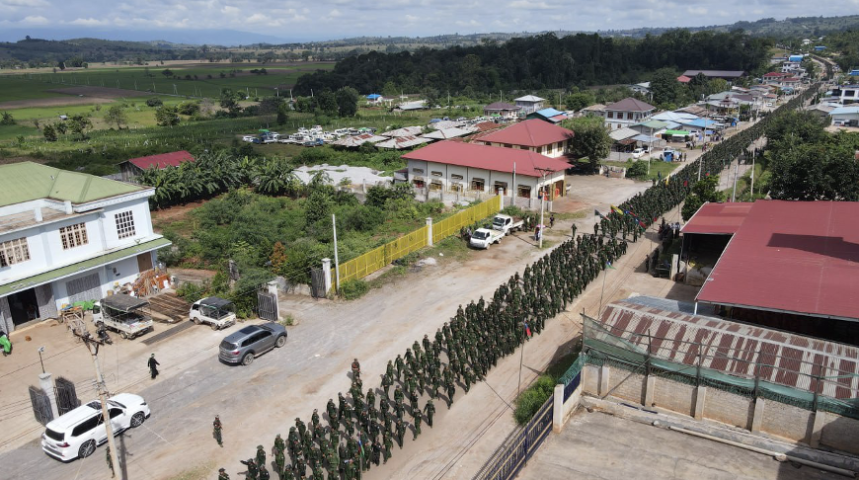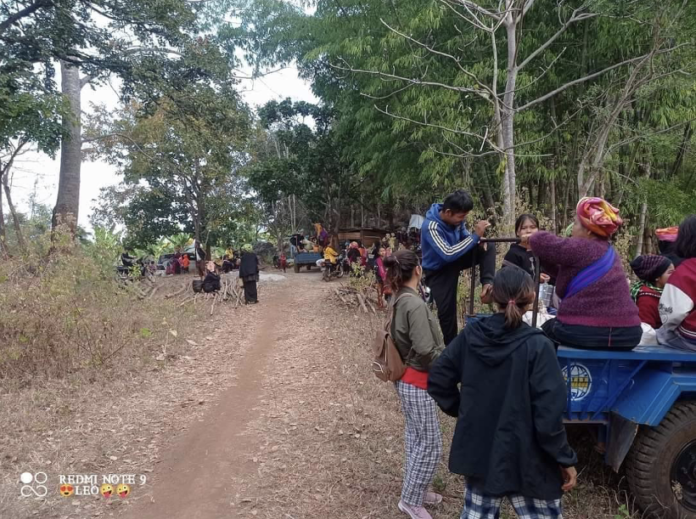Since the third week of January 2024, fighting has been taking place in Hsihseng Township between the military council-backed Pa-O National Organization (PNO) which is active in Hsihseng, Nyaungshwe, Hopong and Pinlaung Townships in southern Shan State.
After the fighting between the PNO and Pa-O National Liberation Army (PNLA), the junta-backed PNO have increased tax collections citing various reasons, according to locals.
On the other hand, the PNO has demonstrated its strength by deploying large numbers of forces. The locals are facing significant hardships due to the PNO’s forced use of vehicles and frequent tax collection from car owners. Additionally, some residents have been forced to flee their homes due to ongoing fighting in Pinlaung and Hsihseng.
Locals are struggling to generate income as they are unable to engage in agricultural work due to the ongoing fighting in the region. Their livelihoods are further impacted by the PNO militia’s tax collection under various pretexts, all while commodity prices continue to rise. Below are the voices of locals who are facing hardships as a result of the PNO’s tax collection under various pretexts.

Nan Oo (a local from Hsihseng)
The PNO collects taxes ranging from Ks 50,000 to Ks 100,000, with some villages requiring payments based on the size of vehicles. For instance, locals may have to pay up to Ks 100,000 for a power tiller. Due to the ongoing fighting, the residents are unable to carry out their farming activities, and many have been forced to flee their villages. As a result, they are facing severe financial difficulties and cannot earn a livelihood. Some have resorted to working as daily wage earners, struggling to make ends meet. Others cannot afford to pay the taxes because they have no money, having been displaced for an extended period. They are often forced to borrow from wealthier individuals to cover the tax payments, accumulating debt. All wars are the same, as the absence of peace only leads to widespread suffering. The people bear the brunt of the conflict, losing their homes and livelihoods. The ongoing war has displaced countless civilians, and those who remain are forced to survive on public food aid. Despite these efforts, many are still struggling because they cannot return to their work or rebuild their lives.
Khun Sein (a local from Pinlaung)
In our area, taxes are collected once or twice, depending on the type of vehicles. Some people cannot afford to pay these taxes, and during these times, they are threatened. The tax collection continues in other villages, and it severely hampers the livelihoods of families. The slow flow of commodities further complicates the situation, especially for those who rely on daily wages. It becomes extremely difficult for them to survive. There would be no issue if the taxes collected were used properly and not abused. We would not oppose if the money is spent on providing defense for the locals, but we strongly object to any misuse of the funds.
U Aung (Hopong local)
They began collecting taxes after the forced use of vehicles. However, they do not dare to collect taxes in the downtown areas, focusing primarily on the Pa-O people. Tax collection is frequent in Hopong and nearby villages, with the rates varying from village to village. The current situation is extremely difficult for the locals. People are burdened with paying for military service and vehicle taxes. The authorities show no concern for the public’s well-being, acting solely in their own interest. This has made it increasingly difficult for people to earn a living, going against the will of the community. Those who cannot afford to pay are particularly struggling.
An official of PYO
The PNO/PNA is persistently engaged in tax collection across the Special Region-6, where they are active. Locals are consistently required to pay taxes, regardless of whether they can afford to do so. The people are being forced to pay taxes, and many are not okay with this practice. At present, they have no choice but to pay, even if they cannot afford it. Tax collection is a significant burden, with some residents resorting to borrowing money to meet the demands. The impacts of this situation vary for different individuals, with each facing unique challenges.
Some families are forced to pay taxes despite facing severe livelihood difficulties. We are required to pay various types of taxes, and the amounts differ. There has been a noticeable increase in tax collection in the conflict-affected areas,
On the other hand, during this period of displacement, the mandatory tax collection is extremely difficult for us as we are just trying to survive. The public response reflects that many people are struggling to stay alive, with no one in a comfortable position.
The people are required to pay various types of taxes due to the presence of many armed forces in the region. In some areas, taxes range from Ks 300,000 to Ks 500,000, while in others, the amounts can reach between Ks 500,000 and Ks 1,000,000. Additionally, there are numerous smaller taxes that vary depending on the region. In many cases, locals are also forced to pay money for the recruitment of soldiers. These tax burdens have both direct and indirect impacts on the people. However, the most significant challenge is the constant threat of violence, which far outweighs the tax collection itself.
For instance, in a village, whether the people support the PNO/PNA or not, they constantly face threats and pressure. Despite support, the PNO/PNA continues to burn houses and make door-to-door threats. While tax collection is a burden on the people, the direct pressures and threats from the armed forces have a more immediate and severe impact. It is difficult to provide concrete evidence of the full extent of these issues, but their effects are clearly felt by the local population.
No group should engage in the unfair collection of taxes from the public. Such practices should never occur. I believe their policies should not include the forced collection of taxes. This oppressive behavior is reminiscent of a dictatorship, and it should not be allowed. The worst part is that they view the public as a source of money. It is a widely shared belief that they should not demand money from the public under the guise of protecting them, especially when the people are struggling just to survive day by day.
Sent by Shan News

